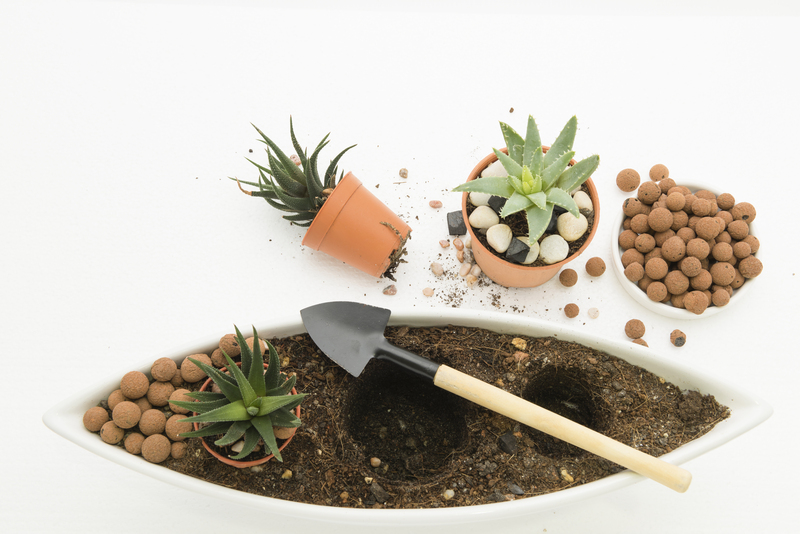Ecological Alchemy: Organic Waste into Soil
Posted on 04/09/2025
Ecological Alchemy: Transforming Organic Waste into Fertile Soil
In our increasingly waste-conscious world, ecological alchemy stands as an innovative practice that turns what many consider trash--our organic waste--into a rich and life-giving resource: soil. Harnessing this process not only diverts valuable materials from landfills but also rejuvenates ecosystems, boosts food security, and supports a greener planet.

Understanding the Magic: What is Ecological Alchemy?
The phrase ecological alchemy evokes images of ancient sorcerers turning base metals into gold. In reality, this modern-day magic refers to the art and science of converting organic waste to fertile soil. Whether it's banana peels, coffee grounds, garden clippings, or even agricultural byproducts, the alchemy lies in using natural processes to break down waste and generate soil humus--a vital component for healthy plant growth.
Organic Waste: The Gold Beneath Our Feet
- What is organic waste? It's any material derived from living organisms--plants or animals. Think kitchen scraps, leaves, grass cuttings, paper, or food processing remnants.
- Why is it valuable? When properly processed, organic waste returns vital nutrients to the earth, closing the loop in the nutrient cycle.
The Process of Soil Creation: Nature's Cycle
Nature has been recycling organic material for millions of years. But with ecological alchemy, humans can actively manage and accelerate the transformation of organic refuse into fertile soil.
The Stages of Transformation
- Collection: Gather organic waste materials, such as fruit rinds, vegetable peels, coffee grounds, yard trimmings, and more.
- Decomposition: With the help of microbes, fungi, insects, and worms, complex organic molecules are broken down into simpler compounds.
- Maturation: As materials decompose further, they become dark, crumbly compost or humus, teeming with nutrients and beneficial organisms.
- Soil Enrichment: Finished compost is blended into existing soils, boosting fertility, structure, and water-holding capacity.
Key Players in the Alchemy
- Bacteria: The primary decomposers, breaking down organic matter quickly.
- Fungi: Decompose tougher materials such as wood and lignin, forming mycelial networks that enrich soil.
- Invertebrates: Earthworms, beetles, and other detritivores further fragment organic matter and aerate the soil.
Benefits of Converting Organic Waste into Soil
The ecological transformation of organic refuse into fertile earth offers numerous benefits on both a local and global scale. These include:
- Reduces landfill waste: Organic materials make up over a third of municipal solid waste. Composting diverts this material from landfills, where it would otherwise generate methane, a potent greenhouse gas.
- Improves soil health: Adding organic matter improves soil structure, porosity, and water retention, encouraging robust root systems.
- Offsets chemical fertilizers: Compost provides slow-release nutrients, reducing dependency on synthetic fertilizers that can harm the environment.
- Enhances biodiversity: Compost-rich soils host a vibrant ecosystem of microbes, insects, fungi, and plants.
- Mitigates climate change: By promoting soil carbon sequestration, the process helps store atmospheric carbon in the ground.
- Promotes food security: Fertile soils support higher crop yields and healthier food production.
Different Methods for Turning Organic Waste into Soil
There isn't just one way to practice soil creation from organic waste. Several methods have been developed, each with its own advantages and best uses, from backyard bins to community-scale projects.
Traditional Composting
- Hot composting: By layering green (nitrogen-rich) and brown (carbon-rich) materials and maintaining moisture and aeration, microbial activity rapidly heats the pile, breaking down organics in weeks to months.
- Cold composting: This hands-off method simply accumulates organic materials in a pile or bin. Decomposition is slower, taking six months to two years, but requires less attention.
Vermicomposting
- Worm composting: Red wigglers (Eisenia fetida) process kitchen scraps in bins, turning it into high-quality worm castings (vermicompost), which are nutrient-dense and excellent for plant growth.
Bokashi Fermentation
- Bokashi method: This Japanese technique uses effective microorganisms (EM) to ferment organic material (including meats and dairy, usually avoided in standard composting). The result is a pre-compost that breaks down fully once buried in soil.
Large-Scale and Industrial Composting
- Windrow composting: Organic waste is arranged in long rows, regularly turned for aeration. Ideal for farms and municipalities.
- In-vessel composting: Enclosed containers tightly control temperature, moisture, and air, accelerating decomposition for cities or companies with limited space.
- Anaerobic digestion: In oxygen-free environments, microorganisms decompose organic matter, producing biogas (for energy) and digestate, which can enrich soil.
Best Practices to Convert Organic Refuse into Soil
Success in organic waste soil alchemy requires attention to detail and a few fundamental principles.
Balance the Ingredients
- Carbon-to-Nitrogen Ratio: Aim for a balanced mix--approximately 25-30 parts carbon ("browns," like dry leaves and cardboard) to 1 part nitrogen ("greens," like food scraps and grass).
Maintain Moisture and Airflow
- Moisture: Compost should feel like a damp sponge. Too wet? Add dry brown materials. Too dry? Add water or fresh green waste.
- Oxygen: Aerobic microbes need oxygen--turn or fluff the pile every week or two to avoid sour, smelly, anaerobic conditions.
Monitor Temperature
- Heating up: Active compost piles reach 55-65?C (130-150?F), killing pathogens and weed seeds.
Harvest When Ready
- Mature compost: Finished soil amendment is dark brown to black, crumbly, and earthy-smelling--no visible food scraps remain.
Common Challenges and Solutions in Organic Waste to Soil Transformation
Managing Pests and Odors
- Problem: Compost piles can attract rodents, flies, or develop unpleasant smells.
- Solution: Avoid adding meats or dairy, cover fresh waste with brown material, maintain proper moisture, and use secure compost bins.
Compost Not Heating Up?
- Problem: If decomposition is slow, the pile may need more green (nitrogen) material, moisture, or turning.
- Solution: Chop materials smaller, add water, and mix thoroughly.
Dealing with Unwanted Materials
- Problem: Some organic materials, such as diseased plants, glossy paper, or chemically treated wood, are unsuitable for compost.
- Solution: Only use safe, untreated, and non-toxic input materials for your ecological alchemy.
The Science: How Organic Waste Improves Soil Quality
The transformation of organic waste into soil is miraculous--yet rooted in simple science.
- Nutrient cycling: Compost replenishes essential elements like nitrogen, potassium, and phosphorus, making them available to plants.
- Soil structure: Organic content binds mineral particles into aggregates, improving aeration and drainage.
- Water retention: Humus increases the soil's capacity to hold water, reducing irrigation needs and runoff.
- Microbial life: Compost introduces beneficial microbes that help suppress plant diseases and break down nutrients.
- pH buffering: Compost can moderate soil acidity or alkalinity.
Ecological Alchemy at Home: Getting Started
You don't need vast amounts of land or specialized equipment to begin your own ecological alchemy journey. Here's a step-by-step guide for household composting:
- Choose a method: Select between backyard composting, vermicomposting, or a Bokashi system.
- Start small: Collect kitchen scraps in a kitchen caddy or sealed container to prevent odors.
- Build your pile or bin: In your yard or on a balcony, alternate layers of brown (e.g., dried leaves, newspaper) and green (e.g., food scraps) materials.
- Maintain: Turn the pile and monitor moisture. In a few months, harvest your rich, crumbly soil amendment!
Supporting a Circular Economy
When communities and individuals embrace organic waste soil transformation, they promote a circular economy--one in which waste becomes a resource and nothing is discarded unnecessarily. Cities worldwide are implementing food scrap collection and composting programs, farmers are pioneering industrial-scale compost systems, and gardeners are tending to home compost bins, proving that this ecological alchemy is universally relevant.
Notable Examples from Around the World
- San Francisco, USA: Mandatory citywide food waste recycling has helped divert over 80% of the city's waste from landfills.
- Flanders, Belgium: Decentralized community composting centers serve neighborhoods and reduce transportation emissions.
- India: Small-scale farmers use cow dung, crop residues, and organic matter to restore soil fertility organically.

Future Directions: Innovations in Organic Waste-to-Soil Alchemy
Emerging technologies are enhancing our ability to transform organic waste into living soil:
- Biochar: Pyrolyzing organic materials in low oxygen produces charcoal-like biochar, which stabilizes carbon in the soil for centuries and improves fertility.
- Mycoremediation: Fungi are harnessed not only to break down waste but also to detoxify contaminated soils.
- Smart composting: Sensors and artificial intelligence help optimize large-scale composting by monitoring temperature, moisture, and gas emissions.
Conclusion: From Waste to Wealth through Soil Alchemy
The practice of ecological alchemy--converting organic waste into soil--is more than an environmental trend; it's a vital ecological service for the planet's health and future. By understanding the science, applying best practices, and participating in this modern-day magic, we become responsible stewards of our resources and champions for a regenerative, sustainable Earth.
Start your journey today: Save your scraps, build a compost pile, or join a community program. With each apple core and leaf, you contribute to the centuries-old process of ecological alchemy: organic waste into soil, ensuring fertility and abundance for generations to come.
Latest Posts
Vertical Gardening: A Green Revolution for Urban Dwellers
Orchid Care Essentials for Beginners
Must-Have Gear for Every Gardening Adventure
Seasonal Shield: Prepare Your Plants for Winter's Harshness
Transform Your Garden into a Fort with These Severe Weather Protection Tips

